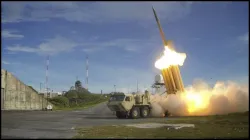What is THAAD, the advanced US anti-missile system being provided to Israel? EXPLAINED
The US decided to deploy an advanced THAAD anti-missile system along with 100 US troops to Israel, which is rare considering Israel's own defensive capabilities. The US has promised to aid Israel's defence as it weighs a response to Iran's October 1 missile attack.

In a significant move, the United States has decided to deploy an advanced THAAD anti-missile system along with 100 US troops to Israel, which is weighing its response to Iran's missile attack on October 1 amid separate conflicts with Hezbollah in Lebanon and Hamas in Gaza, pushing the Middle East deeper into a crisis. US President Joe Biden said the move was meant "to defend Israel" after the Iranian attack.
"At the direction of the President, Secretary Austin authorised the deployment of a Terminal High-Altitude Area Defense (THAAD) battery and associated crew of US military personnel to Israel to help bolster Israel's air defences following Iran's unprecedented attacks against Israel on April 13 and again on October 1," said the Pentagon on Sunday (local time) in a statement.
A US military deployment to Israel is rare outside of drills, given Israel's own military capabilities. US troops in recent months have aided Israel's defence from warships and fighter jets in the Middle East when it came under Iranian attack, but they were based outside of Israel. The US deployed a THAAD anti-missile system in Israel after the October 7 attacks and in 2019 for training and an air defence exercise.
What is THAAD?The Terminal High Altitude Area Defence system, or THAAD, is a state-of-the-art aerial defence system that is a critical part of the US military's layered air defence systems and adds to Israel's already formidable anti-missile defences. A THAAD battery usually requires about 100 troops to operate. It counts six truck-mounted launchers, with eight interceptors on each launcher, and a powerful radar.
Lockheed Martin, the biggest US arms maker, builds and integrates the THAAD system, which is designed to shoot down short, medium and intermediate-range ballistic missiles. Raytheon, under RTX, builds its advanced radar. "THAAD is the only US system designed to intercept targets outside and inside the atmosphere," says the Lockheed Martin website.
Why is US deploying THAAD in Israel?The Biden administration has stepped up defences for Israel to protect it from ballistic missile attacks from Iran and its proxies including Hamas and Hezbollah. This came after Israel launched a blistering military offensive in Lebanon that killed most of Hezbollah's top leadership, including its leader Hassan Nasrallah, within a week. Israel has also eliminated several Hamas commanders, laying waste to the Palestinian enclave of the Gaza Strip.
Iran launched over 180 missiles and drones at Israel in April. Then on October 1, Iran fired more than 180 ballistic missiles at Israel amid another escalation in fighting between Israel and Iran-backed Hezbollah in Lebanon. Many were intercepted in flight but some penetrated missile defences. Israel vowed to retaliate against the attack with the assistance of the United States.
How does the THAAD work?The US Army has seven THAAD batteries in its possession. It comprises four main components - interceptor, launch vehicle, radar, and fire control system. Every launcher carries up to eight interceptors and a typical THAAD battery has at least six launchers. The THAAD covers a larger area than the US-made Patriots.
The THAAD battery intercepts incoming ballistic missiles during their final phase of flight -- which is called the "terminal phase." It can intercept targets both within (endoatmospheric) and outside (exoatmospheric) the atmosphere. It defends against short, medium and intermediate-range ballistic missiles, making it a vital component in national security against missile threats.
What the deployment of THAAD means?The deployment of the THAAD anti-missile system comes as US officials believe Israel has narrowed down targets to Tehran's military and energy infrastructure, as per reports. However, Biden has publicly voiced his opposition to an Israeli attack on Iran's nuclear sites and his concerns about a strike on Iran's energy infrastructure.
Iranian authorities have threatened a harsher response in case Israel retaliates and strikes its nuclear facilities. Iran's Foreign Minister Abbas Araghchi warned earlier on Sunday that the United States was putting the lives of its troops "at risk" by deploying them to operate US missile systems in Israel. "While we have made tremendous efforts in recent days to contain an all-out war in our region, I say it clearly that we have no red lines in defending our people and interests," Araghchi posted on X.
ALSO READ | US to send THAAD anti-missile system, troops to Israel in unusual deployment amid Mideast conflict
